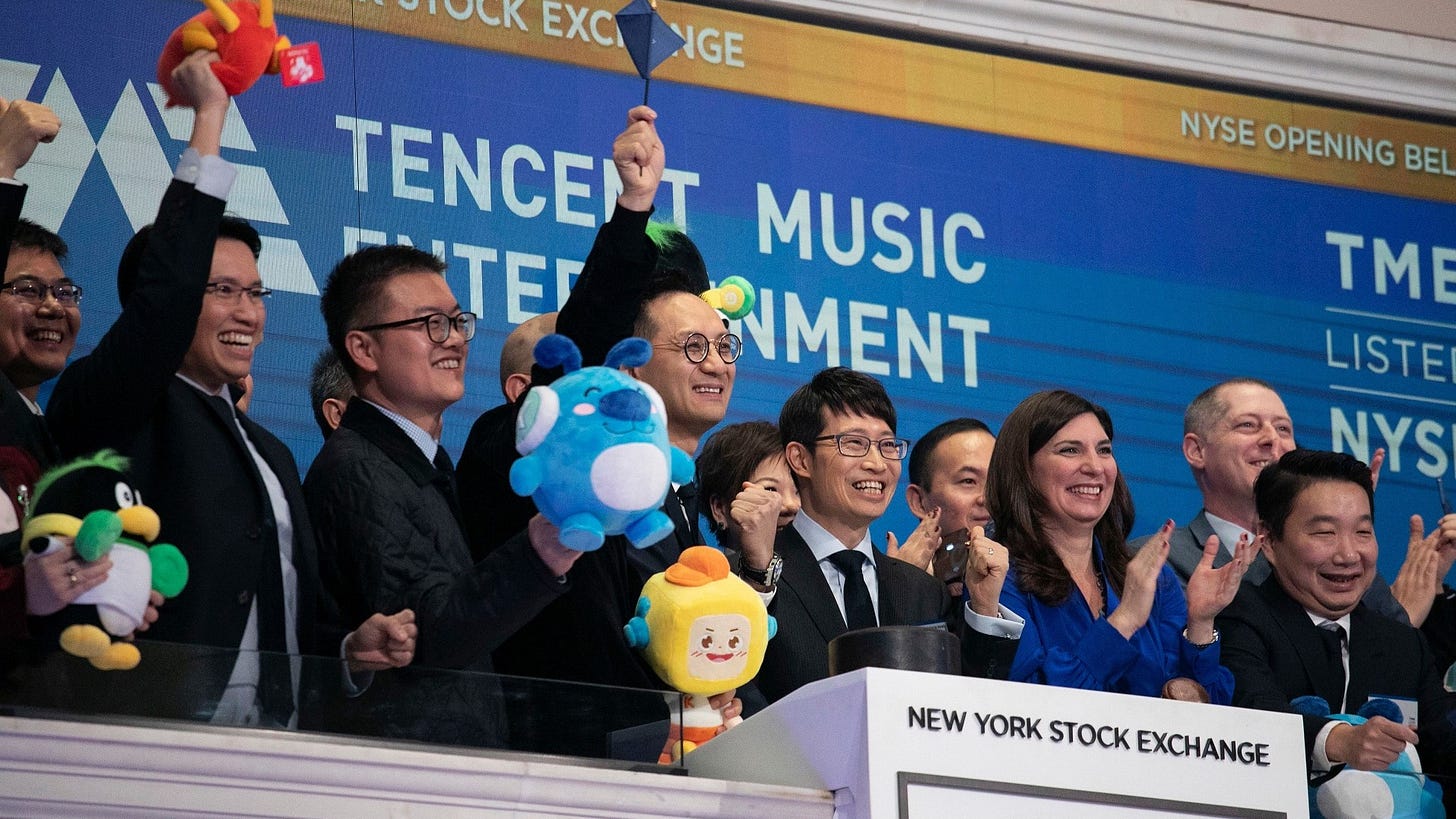🇨🇳China cracks down on Tencent Music
$20 Billion worth Chinese Music conglomerate- Tencent Music Entertainment Group faces anti-competitive regulatory crackdown from the Chinese government
We write a daily newsletter on all things Music, and the Business and Tech behind it. If you’d like to get it directly in your inbox, subscribe now!
Happy Monday everyone!
In what is yet another case of the Chinese government cracking down on Tech Startups in its country, Tencent Music Entertainment Group (TME) has been ordered to give up its exclusive music licensing rights and slapped a fine for anti-competitive behavior ❌
Why so?
The State Administration for Market Regulation (SAMR), the official regulatory body in China, imposed a fine of 500,000 yuan ($77,141) on the company citing violations in its acquisition of China Music Corporation in 2016.
Following that acquisition, Tencent owns more than 80% of exclusive music library resources, giving the company an advantage over its competitors as it is able to reach more exclusive deals with copyright holders 📝
But what really is Tencent Music? 🤔
Founded back in 2016 after Tencent’s acquisition of China Music, Tencent Music controls the majority of the music industry in China, with the following core product offerings:
🎵 QQ Music
A freemium music streaming service in partnership with Spotify, targetting the millennial and Gen Z population with over 120 Million subscribers.
🎧 Kugou
Formed back in 2004 by China Music Corp., which was acquired by Tencent, Kuguo is the most popular music streaming app in China with a 28% market share and boasts over 450 Million subscribers.
👶🏻 Kuwo
Think Kuguo, but genre-specific for DJ Mixes and Kid’s music.
🎤 WeSing
The biggest online music karaoke app in China, with a presence across other Eastern Asian countries such as Indonesia, Thailand, and Malaysia.
📲 Ultimate Music
A B2B ecosystem that provides services to enable various smart devices and automobile manufacturers to develop built-in music players.
Their goal is to integrate music into everything.
Basically, if there’s music in China, chances are that Tencent has a piece of the pie 🤑
Following is a snapshot of their entire ecosystem 👇🏻
It was listed on the New York Stock Exchange in 2018, amidst much fan-fare of being one of the few music streaming companies actually making a profit, and it recently declared a profit of $140 Million for the 1st quarter of 2021.
For context, Spotify lost $810 Million, or basically $2.2 Million every single day of the year in 2020. (source)
With a high-spending middle-class population and control over more than 80% of the market share in China, Tencent proved that not all was lost in the music streaming model, and there is definitely money to be made if you’re fortunate enough to enjoy a monopoly, like theirs.
This seems to have caught the eye of regulators, as part of a wider crackdown on Chinese Tech Startups which saw over $800 Billion being wiped out of the market cap of its biggest Tech stocks, who fear the monopolistic practices of these companies 👇🏻
So what’s next for TME?
Following the latest announcement, Tencent and its affiliates have to relinquish exclusive music rights within 30 days and end requirements for copyright holders to grant the company better treatment than to its competitors.
Tencent will have to report to the SAMR on its progress every year for three years, according to the statement, and the antitrust regulator will strictly supervise its implementation according to law.
TME shareholders have certainly shown cold feet, as the stock is already down from its highs of $30/share, by a whopping 44% YTD, even before this announcement.
It could be interesting to see how this story plays out ahead.
You can’t really say anything when it comes to the Chinese Government right? 🤷♂️
If you liked this newsletter from Incentify, why not share it with someone you like?
P.S- Follow us on Instagram and Twitter for more such content on all things Music and Culture, now!






